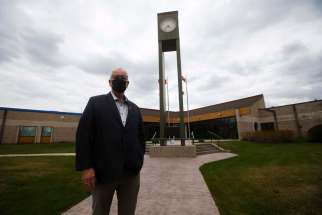Manitoba ICU capacity can expand to 170 beds: health minister Stefanson responds to criticism about absence of life-and-death protocol
Read this article for free:
or
Already have an account? Log in here »
To continue reading, please subscribe:
Monthly Digital Subscription
$0 for the first 4 weeks*
- Enjoy unlimited reading on winnipegfreepress.com
- Read the E-Edition, our digital replica newspaper
- Access News Break, our award-winning app
- Play interactive puzzles
*No charge for 4 weeks then price increases to the regular rate of $19.00 plus GST every four weeks. Offer available to new and qualified returning subscribers only. Cancel any time.
Monthly Digital Subscription
$4.75/week*
- Enjoy unlimited reading on winnipegfreepress.com
- Read the E-Edition, our digital replica newspaper
- Access News Break, our award-winning app
- Play interactive puzzles
*Billed as $19 plus GST every four weeks. Cancel any time.
To continue reading, please subscribe:
Add Free Press access to your Brandon Sun subscription for only an additional
$1 for the first 4 weeks*
*Your next subscription payment will increase by $1.00 and you will be charged $16.99 plus GST for four weeks. After four weeks, your payment will increase to $23.99 plus GST every four weeks.
Read unlimited articles for free today:
or
Already have an account? Log in here »
Hey there, time traveller!
This article was published 18/05/2021 (1666 days ago), so information in it may no longer be current.
Health Minister Heather Stefanson says the province can expand to 170 ICU beds and shouldn’t need a triage protocol to decide who gets a bed and who doesn’t.
If one is required, there’s an ethical framework doctors can use, she said.
“The ethical framework was put in place to ensure that in the event that a triage protocol is needed, it is there to help doctors put that in place,” Stefanson told reporters after question period Tuesday.
During this third wave in Manitoba, ICU admissions are quickly approaching the second-wave peak capacity of 129 patients, and are expected to climb higher.
“Obviously, we’re doing everything that we can to ensure that it doesn’t get to a point where we need to go in that direction,” Stefanson said about rationing scarce ICU beds, noting it’s why the province introduced further public health restrictions, focused on its vaccination campaign and on increasing ICU and hospitalization capacity.
Shared Health’s COVID-19 Ethics Framework Information for Providers, which was posted online in May of last year, says “Leadership/teams responsible for any finite resource (e.g. beds, ventilators, vaccine, IV fluid, personal protective equipment, nurses, etc.) should develop a triage process for determining how each resource will be allocated in times of scarcity.”
Stefanson said the ethical framework is there “as a guideline for the medical team to put in place the protocols, if necessary… We hope it doesn’t get to that point,” she said. “We’ll continue to focus on increasing patient flow within our hospital systems and increasing our ICU capacity by adding more nurses.”
Jennifer Dunsford, an instructor at the University of Manitoba’s College of Nursing, said Tuesday that more than a year ago, she was working at the Winnipeg Regional Health Authority and Shared Health and was an ethics consultant to the pandemic planning group that prepared the framework.
She is shocked there is still no triage protocol to help doctors decide which COVID-19 patients they can help and which ones they can’t in the event cases overwhelm intensive care wards and hospitals, she said.
“We were asking a year ago what the plan was,” Dunsford said.
At that time, there were just a few coronavirus cases being reported daily, she recalled.
“Ideally, a protocol should be in place as part of an emergency plan for years. In the heat of the moment, you don’t want to decide. Ideally, when you’re advocating any type of scarce resources where there is more demand than resources, you need to have a plan,” Dunsford said.
“The physicians need support for making the decisions fairly so it is not just a medical opinion.”
Dr. Anand Kumar, an intensive care specialist, said a triage protocol would be good to have, but it would be hard to put one in place in the midst of a pandemic.
“It would be wise to have a triage protocol in place that has been vetted by the public. I don’t think you can get buy-in by the public just by pulling it from the air. It is probably wise to have had one in place with some public input, but we don’t, and I think that is unfortunate,” he said.
When pressed about Manitoba’s ICU capacity, Stefanson said it could go above 170 beds.
“That’s why we’ve been beefing up our staffing. As the ICU numbers continue to grow, as we expect them to over the course of the next couple of weeks… we will continue to ensure that we are staffing to be able to handle that capacity,” she told reporters.
“If we have to redeploy staff, we’ll redeploy staff to ensure we handle the capacity. Health care officials are working on that internally.”
Earlier planning had identified up to 173 critical-care spaces that could be equipped and functional if staffing were available and assigned, a spokesperson for the province said later Tuesday.
Nurses and doctors warned that the ICU would be overwhelmed with rising COVID-19 cases and there won’t be enough trained staff to care for patients, regardless of how many beds and ventilators are available. The opposition and advocates for Manitobans with disabilities have called on the province to have a plan for — and be transparent about — who will receive ICU care if resources become scarce.
covid-19-shared-health-ethics-framework
“Some people in our province face systemic inequity when it comes to health care,” including Indigenous people, northerners, seniors and Manitobans with disabilities, said NDP Leader Wab Kinew. With ICU admissions expected to rise over the next few weeks, “difficult times” are ahead and there may also be difficult decisions requiring a triage protocol, Kinew said.
“Let’s develop this protocol now before it’s needed,” he said, adding a triage protocol shouldn’t be left up to ICU medical staff to figure out in addition to their duties.
“It’s unfair to ask these physicians and others working in the ICU who are already burned out making heroic efforts at the bedside, to also ask them to try and carefully weigh the system-level implications.”
The protocol should be drawn up to look at best clinical criteria and will mean, sadly, some people won’t get the medical intervention needed if it is determined they are more likely to die than someone else, Dunsford said.
“The criteria is to help who is more likely to survive,” she said. “It can’t be somebody’s assumptions of a person’s quality of life, it also can’t be ethnicity, but you have to have some way of making decisions so clinical criteria is the most fair… it is like battlefield triage. You pour your resources into who is going to survive.”
When the protocol is set up, it has to be made public, said Dunsford.
“It’s for the public trust,” she said. “The criteria needs to be public so the people who would be affected can be prepared or have it reviewed to have the criteria changed or altered.”
carol.sanders@freepress.mb.ca
kevin.rollason@freepress.mb.ca


Kevin Rollason is one of the more versatile reporters at the Winnipeg Free Press. Whether it is covering city hall, the law courts, or general reporting, Rollason can be counted on to not only answer the 5 Ws — Who, What, When, Where and Why — but to do it in an interesting and accessible way for readers.
Our newsroom depends on a growing audience of readers to power our journalism. If you are not a paid reader, please consider becoming a subscriber.
Our newsroom depends on its audience of readers to power our journalism. Thank you for your support.





